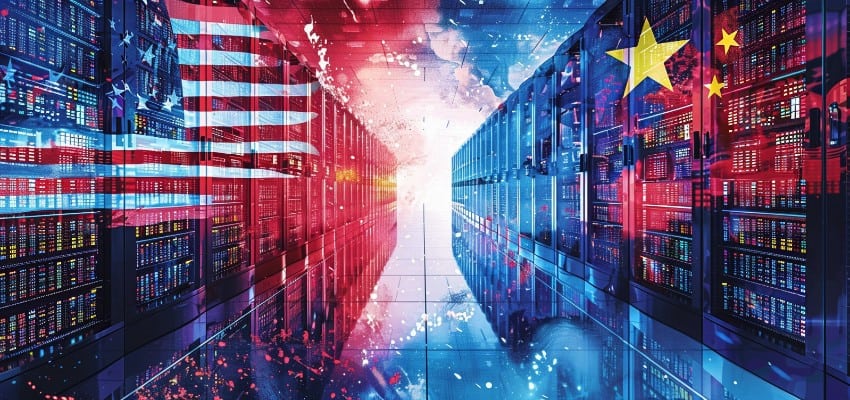Editor’s Note: In the escalating race for supremacy in generative artificial intelligence (GenAI), the global stage is witnessing a compelling narrative of rivalry and ambition between two technological titans: the United States and China. This concise analysis by ComplexDiscovery OÜ staff unveils the dynamic and competitive landscape of GenAI development, where investment, innovation, and strategic maneuvers are shaping a new Cold War-esque technological battleground. With insights into the advancements, challenges, and strategic positions of both nations, this article illuminates the critical importance of GenAI in the realms of cybersecurity, information governance, and eDiscovery. As the narrative of this competition unfolds, professionals and enthusiasts alike are offered a front-row seat to the strategic developments that will define the future of global technology and power distribution.
Content Assessment: The New Cold War: U.S. vs. China in the Great GenAI Race
Information - 91%
Insight - 90%
Relevance - 88%
Objectivity - 89%
Authority - 90%
90%
Excellent
A short percentage-based assessment of the qualitative benefit expressed as a percentage of positive reception of the recent article from ComplexDiscovery OÜ titled, "The New Cold War: U.S. vs. China in the Great GenAI Race."
Industry News – Artificial Intelligence Beat
The New Cold War: U.S. vs. China in the Great GenAI Race
ComplexDiscovery Staff
A deep dive into generative artificial intelligence (GenAI) development reveals an intensifying competition between the U.S. and China, suggesting the emergence of a new Cold War-style technological race.
With GenAI advancements moving at an unparalleled pace, both nations have seen a surge in investment from diverse sectors, propelling their innovation forward. Contrary to concerns that China might be lagging, delegates at the National People’s Congress relayed a stance of parity with U.S. capabilities. A declaration from the CEO of 360 Security Technology to Bloomberg’s Sarah Zheng affirmed that Chinese AI companies have briskly evolved to match the prowess of OpenAI’s ChatGPT.
Microsoft Corporation, a pivotal supporter of OpenAI, has capitalized on the merger of vast language models and GenAI, positioning itself at the top of the U.S. AI industry. Analyst Brad Reback from Stifel echoed the sentiment, recognizing Microsoft’s GenAI scale as a formidable edge for the tech titan. Reinforcing this viewpoint, Microsoft’s GenAI ingenuity is perceived as distancing it from competitors.
Heavyweights like Baidu Inc. have contributed to the debate over AI leadership in China. Baidu’s launch of Ernie Bot is hailed as a milestone, while the Bureau of Economy and Information Technology cites over 80 significant language models by various Chinese AI developers, including Alibaba’s Tongyi Qianwent and Huawei’s Pangu 3.0, as evidence of China’s stout AI footing.
Yet, maintaining this rapid evolution poses a critical question, particularly in light of the U.S.’s strategic advantages – a point underscored by the Commerce Department’s imposition of export controls on pivotal technology such as advanced semiconductors and GPUs. This tech embargo, tailored to obstruct AI breakthroughs, significantly disadvantages Chinese developers reliant on American firms like NVIDIA Corporation, Advanced Micro Devices, and Intel Corporation for essential components.
Trivium China’s Kendra Schaefer and the Wadhwani Center for AI’s Gregory Allen have articulated concerns regarding China’s ability to compete, estimating its manufacturing of high-end equipment as substantially behind, a sentiment shared by the echoing decline of the iShares U.S. Technology ETF under export restrictions.
Nevertheless, the AI race is far from a closed chapter. Current trends within the AI industry, as detailed to InformationWeek by authorities such as Jerome Pesenti, former head of AI at Meta, and David Guarrera at EY Americas, highlight dynamic shifts as varied players, including Alibaba, Tencent, and Baidu vie for excellence within China, parallel to the global pursuits of Google, AWS, and Microsoft to widen their reach within GenAI.
Now, with Microsoft’s latest investment bolstering OpenAI’s valuation and Alibaba’s backing of startups like MiniMax, the AI landscape is redefining corporate strategies across the board. Investments such as the record-setting billion-dollar funding of Moonshot AI reflect a deeper commitment across all fronts.
Amidst this reach for AI supremacy, regulatory challenges and market dynamics pose their own hurdles. From copyright lawsuits to governmental interventions, GenAI’s broader adoption faces intricate paths needing careful navigation. The blend of proprietary platforms, strategic investments, and corporate clout shapes an unpredictable future that transcends mere comparisons of technological prowess.
As the industry evolves and unfolds, the tenacity of U.S. and Chinese efforts will determine the contours of GenAI’s dominance on the global stage. Inherent in those efforts is an ongoing dialogue about responsibility, regulation, and the promise of generative AI to redefine industries—a promise that hangs, as ever, in a delicate balance between innovation and control.
News Sources
- Can Anyone Be a Realistic Competitor for OpenAI?
- Artificial Intelligence: A New Battlefield For US-China Supremacy
- Alibaba Makes Second Major AI Investment in 2024, Backs MiniMax in a $600M Round
Assisted by GAI and LLM Technologies
Additional Reading
- EU Passes Groundbreaking AI Act: Implications for Cybersecurity, InfoGov, and eDiscovery
- Prompt Engineering: The New Vanguard of Legal Tech
Source: ComplexDiscovery OÜ



























